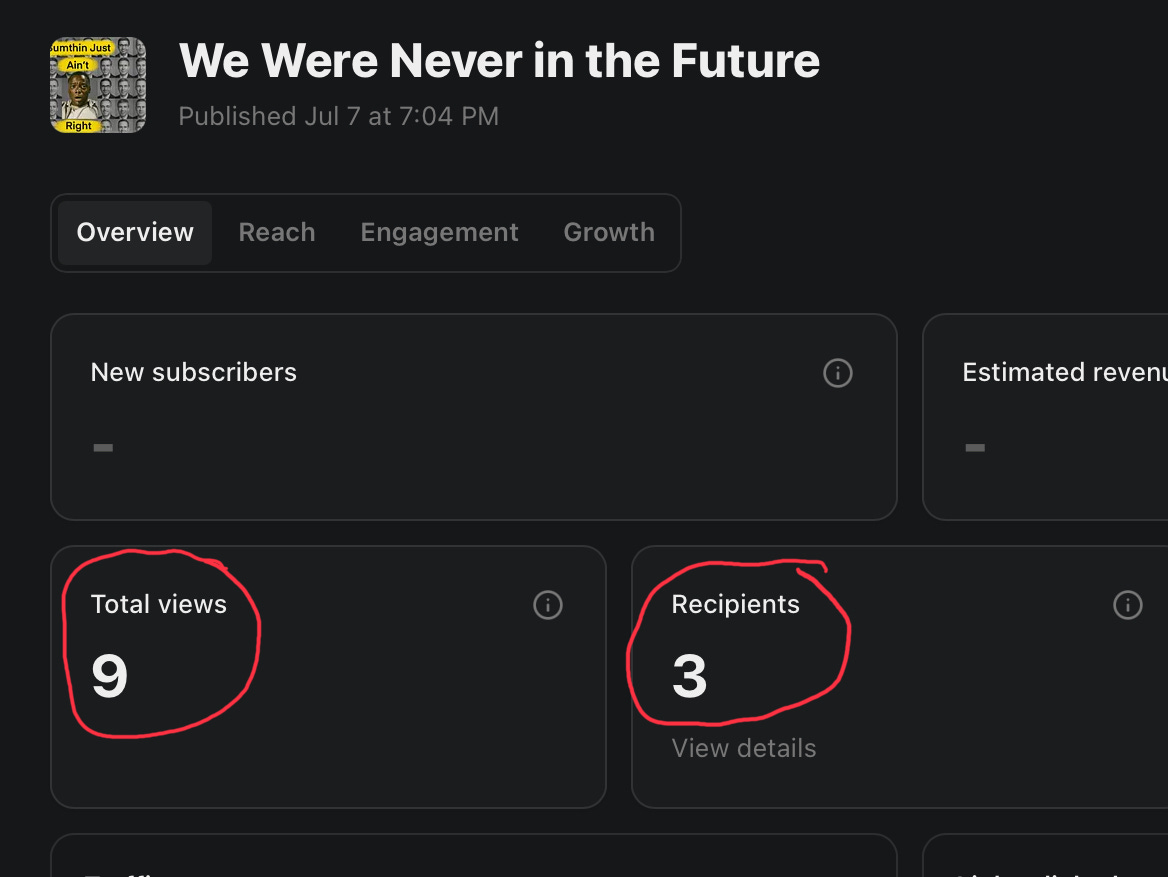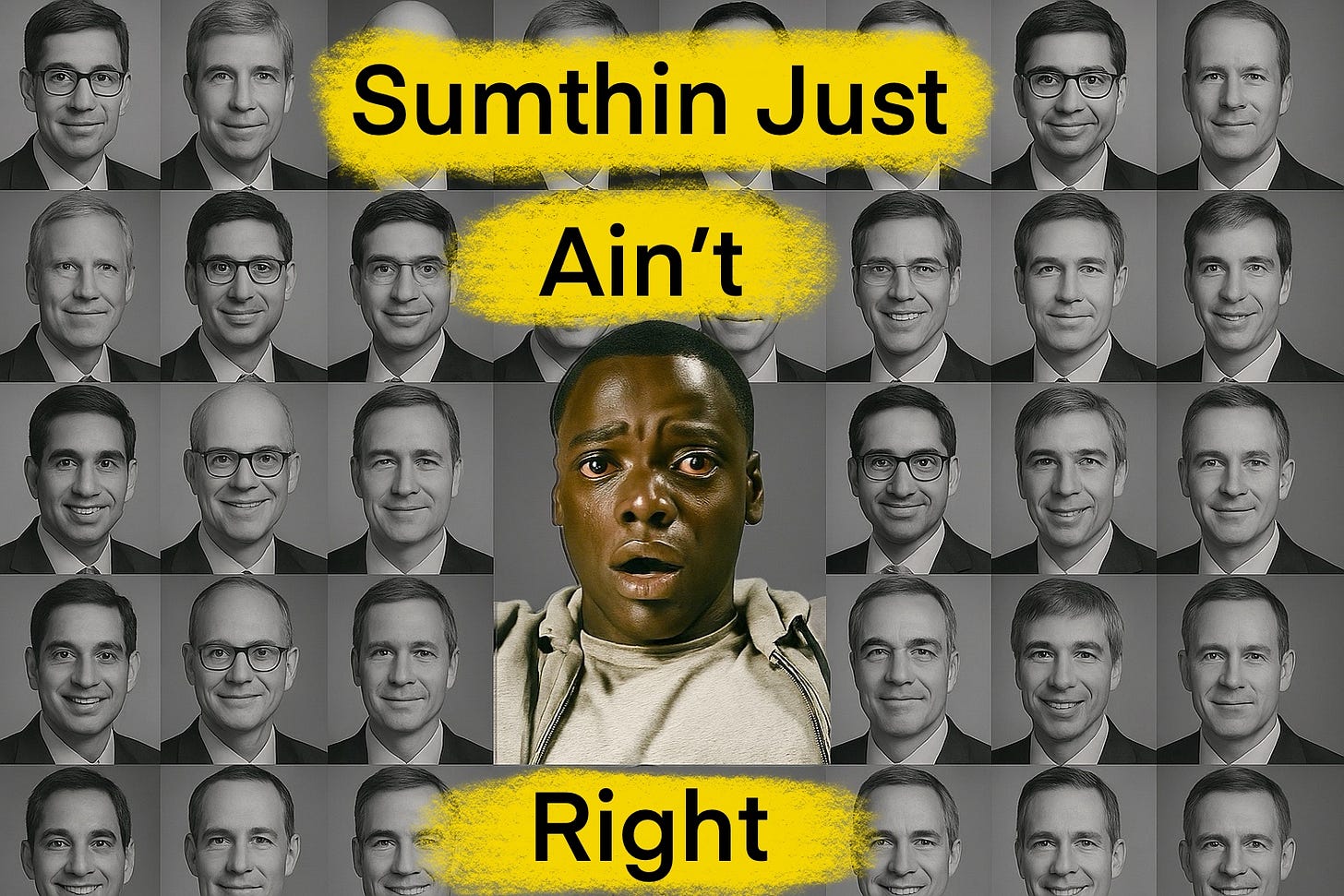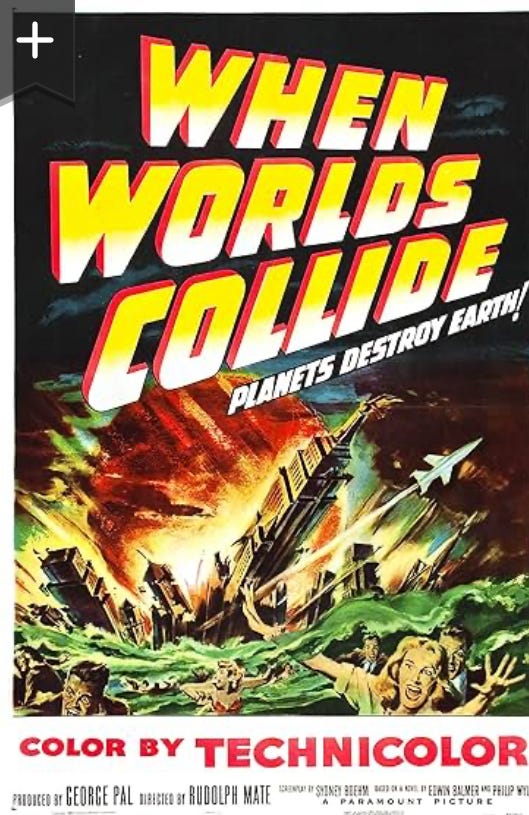XPLisset Archives: Lost Tapes
9 views. Damn… was I that bad, or did I just sell soul food on a block full of vegans?
I dropped this on July 4th when my entire audience could fit in the backseat of an Uber. Less than five subscribers. No algorithm. No hype. Just me hitting “publish” like somebody was out there waiting for it. Spoiler y’all : they weren’t.
And that’s a damn shame, because this one? This one still makes me mad in the exact same way it did the day I wrote it. It’s about the day I realized the future wasn’t built for us and how forty years ago, Donald Fagen already saw this AI world coming.
So I’m pulling it out the vault. Same raw edges. Same fire. Just finally giving it the spotlight it deserved the first time. Ok here it is ya’ll.
Sumthin Just Ain’t Right
I was a kid the first time I realized the future wasn’t built for me.
It was a sci-fi movie I stumbled across one Saturday afternoon, When Worlds Collide. The Earth was doomed, and the “solution” was a spaceship, launched from what looked like a rollercoaster track, that would carry a handpicked few to safety on another planet.
As the ship launched, the camera slowly panned across the faces of the chosen ones.
All white. Clean-cut. Grateful.
Even as a child, I understood what that meant. I didn’t have the language for it yet, but I felt it. The cold realization that if that rocket were real, I wouldn’t be on it. My mama wouldn’t be on it. My people, the ones who built this country, who prayed in church basements and made do with not enough, wouldn’t even be invited to watch it lift off.
The world was ending. And they were boarding the spaceship ark without us.
Fast-forward a few decades, and I watched the same scene again. Only this time, it was real.
Peter Diamandis,, an American engineer, physician, and entrepreneur, stood before an all-white audience, calmly discussing the wonders of life extension, AI doctors, gene therapy, digital immortality.
No urgency. No moral weight. Just optimism. The air in that room felt like a TED Talk version of the Rapture. I scanned the room.
Not a single Black face.
They were talking about saving humanity.
But they meant themselves.
And then I thought of Donald Fagen.
His 1982 song “I.G.Y. (What a Beautiful World This Will Be)” has been ringing in my head lately not just because of the title, but because of the quiet precision of its satire. It’s all there: the technocratic dreams, the sleek cityscapes, the synthetic hope.
“A just machine to make big decisions
Programmed by men with great precision…”
And then, the uppercut:
“Programmed by men with great compassion…”
He wasn’t mocking tech itself nah, hell, I.G.Y. was one of the first digitally recorded songs in pop history. Fagen wasn’t afraid of the future. He just didn’t trust the people designing it.
And he wasn’t wrong.
I’ve read that major tech companies offered him millions to license the song for ad campaigns and he turned them down. He wouldn’t let them turn his warning into a jingle. That tells you everything. Because this wasn’t just a funky synth groove. It was a prophecy. It was a subtle, wry, jazz-laced warning about what happens when power, precision, and “progress” are handed to the wrong kind of men.
And what gets me, no rather, what haunts me is that in 2025, with all the AI think pieces and TED Talks and GPT powered sermons about “the future,” no one is referencing this song.
Nobody.
The most important musical critique of techno-utopianism ever recorded… and it’s like it never existed.
Well. I guess we’ll have to leave it to the retired cop with one subscriber to connect the dots.
What a Beautiful World (But For Who?)
Donald Fagen saw the future in 1982.
He just didn’t trust it.
And now, forty years later, I find myself sitting in the audience of that future. Watching it unfold. Watching the same archetype of the polished data-glowing futurist deliver a new gospel:
AI will be your teacher.
AI will be your doctor.
AI will be your therapist, your guide, your friend.
In that seminar titled “Our Lives After the AI Revolution”posted in the YouTube video earlier in this article , Peter Diamandis addresses an all-white audience, calmly laying out what the next century will look like. It was clean. Efficient. Eternal.
Gene therapies for aging. AI-enabled longevity. AI government. AI god.
“We’re entering the era of post-scarcity,”
“We can teach AI to raise our children, heal our bodies, extend our lives.”
A white woman in the audience stood up, somewhat visibly shaken. Her voice cracked.
“If robots do all the thinking… and they live forever… then what are we supposed to do?”
Peter answered her gently. “Purpose will evolve,” he said. “People will find new meaning.”
He meant well I think. But again, I scanned the room.
No Black women.
No Black men.
No one from the margins.
And I couldn’t shake the feeling that I’d seen this before.
When Worlds Collide.
The white ark.
(*For anyone not familiar with When Worlds Collide:
Imagine Earth on the verge of destruction and a last‑ditch rocket ship built to save only a handpicked few. The cast of survivors? All white Anglo‑Saxons. And in the real world of 1950, white people including Europeans, North Americans, Australians, and others of European descent accounted for just over 21% of the global population)
Except now the spaceship wasn’t made of metal. It was made of code.
And the launchpad wasn’t a rollercoaster. It was a Google keynote.
This isn’t just about AI.
It’s about who gets to imagine themselves in the future.
We are watching the creation of a new ark.
And again, we are not on it.
“Programmed by men with great compassion…”
That line from I.G.Y. doesn’t just echo—it hits different now.
Because I’ve seen those men. I’ve seen the rooms they fill. I’ve heard the promises they make.
And I’ve seen who they don’t invite.
The Jobs Are Gone. The Bias Is Not
If the first red flag was who they imagine surviving the future…
The second is who they imagine working in it.
Dario Amodei, CEO of Anthropic, recently sat down for a mainstream interview and did something few in his position ever do:
He told the damned truth.
“AI could wipe out half of all entry-level white collar jobs.
We may see 10 to 20 percent unemployment in the next five years.”
He didn’t sugarcoat it. He didn’t wrap it in “pivot to purpose” language.
But here’s the part that stopped me cold:
“Cancer is cured.
The budget is balanced.
The economy is booming…
And 20% of people still don’t have jobs.”
That’s their definition of prosperity.
And now apply the racial overlay they never mention:
If white America catches a cold, Black America gets pneumonia.
So what happens when white America gets pneumonia?
These mass layoffs?
They’re hitting the MBA class. White-collar professionals. The people who thought they were the future.
And if they’re panicking… where does that leave us?
We were already last hired and first fired.
Already shut out of “high-skilled” sectors unless we came with a TED Talk smile and no opinions about race.
Now we’re being told to learn to prompt the same machine that scraped our culture, erased our faces, and calls our voices “nonstandard English.”
That’s automation with better PR.
When they say the future of work is changing, they don’t mean for everyone.
They mean it’s changing for them and we’re just collateral.
The New Minstrel Show Is Algorithmic
Open TikTok and type “Black GPT.”
You’ll find AI-generated slaves.
Deepfaked Black women yelling “Yaaas.”
Avatars in chains talking about Kool-Aid and fried chicken.
It’s grotesque. But it’s also viral. Overlorddems breaks it down in the following YouTube video.
“Why am I seeing depictions of slavery for laughs?”
“Why is trauma just normal now?”
Because the algorithm doesn’t hate you.
It just doesn’t see you as fully human.
That’s worse.
Black dialects, mannerisms, and cultural touchpoints are being extracted, exaggerated, and looped for views—with no authorship, no agency, no attribution.
We weren’t invited into the future.
But they brought our rhythm. Our cadence. Our comedy.
Not to celebrate us. To simulate us.
And then they call it content.
We were content.
Then we became training data.
Now we’re the punchline.
Pipelines vs. Pariahs – The AI Caste System
On the Moonshots podcast, the hosts gushed about South Indian tech talent.
“Their language structure primes them for math and logic. That’s why they dominate.”
They weren’t just complimenting. They were confirming a hierarchy.
Because South India didn’t just emerge no, it was built.
By British colonial schools.
By elite institutions like IIT Madras.
By U.S. immigration policies that favored educated, English-speaking STEM grads.
It’s a pipeline.
One Black America was never offered.
We built HBCUs from scratch.
And still got labeled the “diversity hire.”
“They gave AI their language—and it gave them the future.
We gave AI our culture—and it turned us into training data.”
Just like the motion picture camera once gave us The Birth of a Nation,
AI now gives us VEO3-generated minstrelsy.
Each new medium inherits the values of the people who funded its prototype.
And if we’re not in the room now, we’ll be erased at scale later.
Baltimore Was the Beta Test
When globalization gutted the Midwest, Baltimore got hit first.
Steel gone. Shipbuilding gone. Livelihoods gone.
What replaced it?
Police. Surveillance. Overdose.
“War on drugs” rhetoric wrapped around an abandoned working class.
Now the same thing is happening again—this time with AI.
“20% unemployment. GDP booming. Budget balanced.”
That’s not a prediction. That’s a threat.
Because Black America has already been living in the AI apocalypse for decades:
Jobless. Discarded. Under surveillance. And told to be grateful for access.
Baltimore was the beta test.
AI is just the full release version with better UX and no guilt.
Black Mirror, White Code – The Garden of Exile
In Genesis, the serpent offered forbidden knowledge.
In 2025, it’s a clean UI and a “pro user” subscription.
But the myth still applies.
AI is the fruit.
The coder is the serpent.
And Black folks are still outside the garden.
Peter Diamandis calls AI governance “the beginning of a better world.”
But if the room discussing that world is 100% white,
then whose world is it? Overlorddems States in his YouTube video earlier:
“The reflection you see in these systems? It’s not us.”
“It’s a parody. A filtered distortion. A hallucination of our image.”
They say the mirror is neutral.
They say the code is objective.
But history says otherwise.
This ain’t a mirror.
It’s a funhouse built by people who never imagined we’d survive, let alone deserve to thrive.
So what now?
We build our own gardens.
We code our own reflections.
We plant seeds that won’t be scraped, flattened, or filtered.
Because this garden?
This one was never meant for us.
I’m writing this from the USA, where the tech bros building tomorrow’s ark probably couldn’t find my block without GPS. Drop your thoughts in the comments especially if you’ve ever had your own “the future isn’t built for me” moment.






Thank you for pulling this out of the vault. In my humble opinion, AI is not a blessing, it's a curse. A curse for those of us who are not white men or the women who choose to be their trophy wives.
As a white woman, I want to thank you for adding another piece of limited understanding to an experience that I will never have myself. How I pray for the day when every culture can bring together joy, compassion, sharing, and equality on the same plate. When I read essays like this, I have a profound sense of shame and loathing for the white culture that I am part of and I am fearful that the ultimate goal for these tech bros is a civilization where the beautiful tapestry that should make a life worth living is erased from the "agenda".